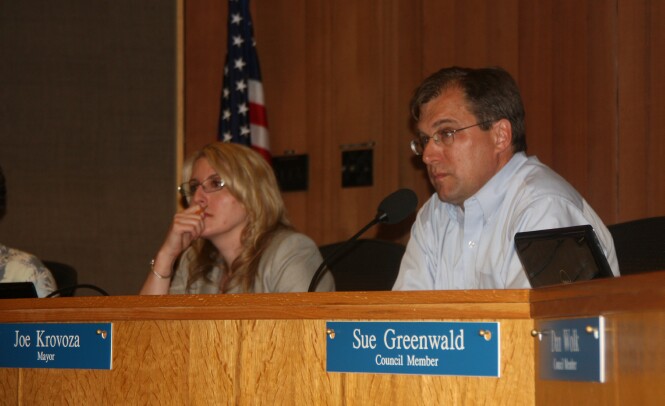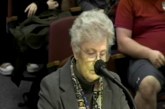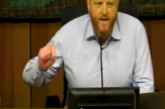 On Wednesday, the Vanguard had a brief phone interview with Mayor Joe Krovoza, talking about the coming year and what is on the horizon for Davis.
On Wednesday, the Vanguard had a brief phone interview with Mayor Joe Krovoza, talking about the coming year and what is on the horizon for Davis.The key question is whether the water issue will be on the June or November ballot.
“I would probably put it at 50-50, maybe even more likely for November.” the Mayor responded, “I think what we do put on the ballot we want to be sufficiently specific so that people can really know what they’re voting on.”
“While I think sooner could be better just in terms of keeping the community engaged on the issue, it may not be possible to be as specific as we’d like to be on rates by June, so November might be a better alternative,” he added.
This would imply that whatever is put on the ballot would have a rate component included, although the Mayor stressed that at least he had not finalized his thinking on that.
But he added, “As you point out, people are so focused on how is this rate really going to affect me that I think there is some risk of putting it on in June, where you would actually have to write the language in February, and only be able to tell people it’s going to cost $160 million and not tell them how it’s actually going to affect their bill.”
That is something they probably will not know until the comprehensive rate study is done and it won’t be done in February.
“An idea that’s catching steam is that we do the [Proposition] 218 process” and finish it in late October, he said. That would also avoid what happened last year with the 218 process occurring during the summer while people were on vacation and allow everyone “to have a chance at participating in public meetings.”
“Immediately following that, we would do a community advisory vote in November,” he said. “We would kind of dovetail the public vote on the 218.”
While he said all of that, he also added that this is the kind of thing he would want to look to the Water Advisory Committee to weigh in on. “I want to be careful not to be dictating that we are going to be doing it this way or another way,” he added.
“I think it’s a real fair question whether or not it helps the community or hurts the community in terms of its engagement if we put something on [the ballot] in June that has a price tag on it but still has lots of unanswered questions about the actual rate,” Joe Krovoza told the Vanguard. “I could see this going either way. I tend to want to ask the community sooner rather than later if this is the right project.”
“Part of my lesson in all of this is that people don’t really stand up and pay attention until the numbers are really concrete,” he added. “And the numbers are not really going to be concrete until we get into the rate setting process.”
We moved on to a discussion of another critical topic, the city’s budget. The budget process has already begun with an early workshop back in November.
“I continue to want to build a budget that is sustainable for the City of Davis, long-term,” Mayor Krovoza told the Vanguard. “That means absolutely making sure that we’re putting away dollars for those unmet needs and long-term liabilities that we know are coming.
“If we don’t do that, then we’re simply borrowing from the future of our town,” he said and added, “and I’m not interested in doing that.”
Mayor Krovoza is looking specifically at roads and retiree health care as the largest categories of unmet needs and unfunded liabilities.
“It is less clear to me at this point exactly how we address the pension issue without the support of the state, other than to make sure in our labor negotiations the employee groups are funding 100% of their share of the pension contributions,” he said.
There are a set of usual topics that often get discussed in the city, that includes development, but not recently. Right now the budget and water are burning issues, but there are other issues the city must grapple with.
“I think an issue [not being talked about enough] is the coordination of business incubation between the campus and the city,” Mayor Krovoza said. “I think there are great opportunities for the city and its culture to support start-ups from the university. I think the campus is profoundly interested in that.”
At the same time, the city is going to have to try figure out how to continue to provide good and high quality services to the public with fewer resources coming into city hall.
“I think we have to keep looking at how we deliver the high level of service to our community and work to maintain that, but make sure that we’re really taking advantage of modern systems for providing that service,” he said referring to public-private partnerships “that might deliver anything from parks maintenance to recreation.”
“I think we’re woefully behind in information technologies that can communicate to the public both the transparency of our government and the services available to them,” he added.
The mayor also spoke to the Vanguard about how the city continues on its goals toward carbon neutrality by the year 2050.
“I’m very excited by the work of the Cool Davis Initiative creating a broad base of community support for this in the business community and the schools, seniors and others to move us toward the city’s environmental objectives,” he said.
The Mayor added, “The city’s activism in support of Lois Wolk’s community solar gardens legislation to allow us to build a solar array at the edge of the city that citizens could invest in. I think it’s a tremendously important way for communities to invest in the state’s original goals objective without ratepayers, who would prefer not to invest in it, having to invest in it.”
The Mayor also added, “I think that roads and how we treat the public space of our roads, is only going to gain more and more attention.”
“The death of Megan Glanville [who was killed on Russell and Lake in late December] on Russell brings this into focus,” he said. “But so too will the actual implementation of the Fifth Street redesign, which I think the greatest benefit of this redesign is going to be increasing the through-put of cars and decreasing the car travel time.
“I think that’s getting completely lost in the debate,” he said. This change will be achieved “by completely shifting the signals at F and G from three-phase to two-phase.”
“In addition, safety for cars, pedestrians and bikes will all go up and we’ll have a much more Davis-centric main street,” he said.
The Mayor added that he believes that this project will finally be moved along by the report of the Technical Advisory Group. “The work of that group,” he added, “is just terribly exciting to me” because of the expertise and heavy-weight status of that group.
“I’m glad we’re not just going to do Fifth Street and collapse,” he noted. “We’re going to do Fifth Street and then we’re going to keep figuring this out.”
“I get lots of emails from moms who are concerned about cars speeding on their streets,” he said. But city staff says we lack the money to pay for speed bumps and that ends the debate. “Davis should be smart enough to figure out how to move beyond that decision-making gridlock for smart roads.”
—David M. Greenwald reporting






“Immediately following that, we would do a community advisory vote in November,” he said.”
Wait a minuet! what’s this about a “community advisory vote”. The June referendum, now put on hold because of the Council’s temporary rate hike halt(to prevent such a referendum) would be determinative, not “advisory votes” which have been ignored by past Councils.
It seems like the Mayor has an excellent idea of what priorities are the most important for the city to grapple with, and plans to address each one by one in a thoughtful and thorough manner. Kudos to the Mayor for doing an excellent job thus far, especially keeping CC meetings much more civil and being respectful of public comment and not “gaming” the agenda by consistently putting important items last on the agenda late into the evening when the public has gone home, or sneaking items under the radar screen as consent items. It is a vast improvement from past leadership.
[quote]Wait a minuet! what’s this about a “community advisory vote”. The June referendum, now put on hold because of the Council’s temporary rate hike halt(to prevent such a referendum) would be determinative, not “advisory votes” which have been ignored by past Councils.[/quote]
The community will be advising the CC what it must do in regard to the surface water project. The Mayor’s follow on statement makes his meaning clear and anything but nefarious as you have suggested:
[quote] I tend to want to ask the community sooner rather than later if this is the right project.”[/quote]
Mayor Krovoza is too slick by half with his citizen-advisory proposal. A citizen-advisory vote which rejects the rate hikes necessary for the current surface water project now will carry little or no weight with the State agency that must grant a variance. Only a citizen-initiated referendum/initiative or Council ballot measure that would PROHIBIT the raising of water rates to pay for this surface water project NOW would have a chance of variance approval, according to Davis PW Director Clark. The Mayor can then claim that the variance denial forces the Council to ignore a negative citizen-advisory vote and proceed with the rate hikes and current project now.
[quote]The Mayor also added, “I think that roads and how we treat the public space of our roads, is only going to gain more and more attention.”
“[u]The death of Megan Glanville [who was killed on Russell and Lake in late December] on Russell brings this into focus,”[/u] he said. “But so too will the actual implementation of the Fifth Street redesign, which I think the greatest benefit of this redesign is going to be increasing the through-put of cars and decreasing the car travel time.
“I think that’s getting completely lost in the debate,” he said. This change will be achieved “by completely shifting the signals at F and G from three-phase to two-phase.”
“In addition, safety for cars, pedestrians and bikes will all go up and we’ll have a much more Davis-centric main street,” he said.[/quote]
Our roads do need attention, but the condition of the roads had nothing to do with this tragedy. Unless we had roads that could lift fog, there is no road that could have prevented this. I don’t know if the Mayor was using this to highlight the Fifth Street redesign or not, but to me they should not have been mentioned in the same paragraph.
I for one do not support the Fifth Street redesign. I don’t know how making a 4 lane road into 2 lanes is going to ease traffic and make things safer.
He also mentions how people complain that cars speed on their streets. After the road diet he will hear from the residents of Old North Davis for sure, the same people who are currently in support of this project.
I can almost guarantee you 2 things that will happen if this project comes to fruition. Someone will get hit by a train, and someone will die because of Fire Personnel’s delayed response due to the traffic jam in front of the station. Most likely the person who was hit by the train.
I wonder if the Mayor would mention their name when praising the Fifth Street redesign in his re-election speech.
We had two phase signals there before, they didn’t work.
How this is going to make Fifth St a more “Davis-centric” main street is lost to me. And what the hell does “Davis-centric” mean.
Approximately 15,000 cars go through this section of road each day. That’s 3750 per lane. Now up that to 7500 per lane. After the road diet there will be no need for a downtown parking structure, there will be on on Fifth. This just doesn’t make sense to me. Covell and Fifth/Russell are the only two 4 lane roads that traverse most of this town, and we are considering putting a choke point in one of them. I would rather turn the entirety of Third Street into a ped/bike only zone than squeeze Fifth.
Why no use what funds we would spend on this project to meet some of our other, more pressing, (not pet project/I like bikes and spandex) unmet needs?
To preston: Like you, I was a doubter too. But when I really investigated the issue, listened to all sides, in short did my homework, I reluctantly came to the conclusion that the 5th St redesign was worth trying. It addresses one particularly nasty problem – the dangerousness of bicyclists going down 5th Street in the downtown area. And bicyclists keep doing it despite the availability of alternate routes that are much safer. If you haven’t done so already, I would highly recommend taking the time to have a discussion with Steve Tracy on the issue of the 5th Street redesign. He made a believer out of me, and I was originally dead set against it…
[quote]Mayor Krovoza is too slick by half with his citizen-advisory proposal. A citizen-advisory vote which rejects the rate hikes necessary for the current surface water project now will carry little or no weight with the State agency that must grant a variance. Only a citizen-initiated referendum/initiative or Council ballot measure that would PROHIBIT the raising of water rates to pay for this surface water project NOW would have a chance of variance approval, according to Davis PW Director Clark. The Mayor can then claim that the variance denial forces the Council to ignore a negative citizen-advisory vote and proceed with the rate hikes and current project now.[/quote]
I’m not following you here. What/how do you know there would be “citizen advisory vote which rejects the rate hikes necessary for the current surface water project”? How do you know that a citizen initiated referendum/initiative or Council ballot measure that would prohibit the raising of water rates to pay for the surface water project would result in the approval of a variance? Speculative assumptions doesn’t make them true or even necessarily likely…
ERM… Krovoza’s citizen-advisory plan is a heads I win.. tails you lose plan.. If a citizen-advisory ballot measure grants approval… he’s happy, if it is rejected by the voters, it’s only advisory and so can be ignored.
As to the variance,as described by DPW director Clark, a variance approval will have the opportunity to be approved IF the rate hike is actually rejected, but, IMO, not as citizen advice to the Council. Yes, one does not know, in fact, it a variance will be approved but if the Council is SERIOUS about seeking a variance rather than empty rhetoric to soothe voter anger, they would put a measure on the ballot that would be mandatory rather than advisory so that the variance request will have a real chance at approval.
To davisite2: There are a myriad of very speculative assumptions in your above scenario, to wit:
1) If a citizen advisory ballot measure grants approval, the mayor will be happy;
2) If a citizen advisory ballot measue is rejected, it only advisory and so will be ignored;
3) If the rate hike is actually rejected, the variance approval will have the opportunity to be approved;
4) A mandatory rather than advisory ballot measure will result in a real chance for a variance approval.